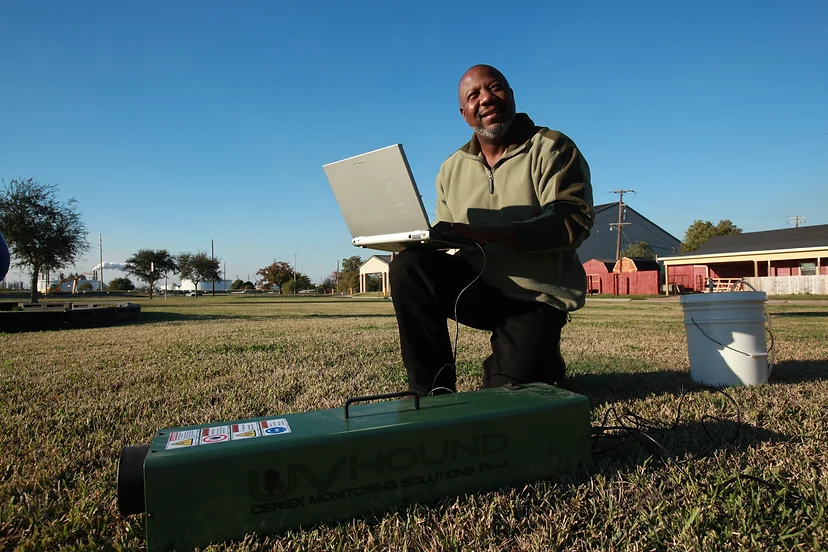Image courtesy of CIDA.
By Kenneth Wohl, Christopher Sellers, and EDGI
Since 1901, when Texas oil first gushed in nearby Beaumont, the city of Port Arthur, Texas, has been synonymous with oil refineries. As “center of the world’s most prosperous oil refining facilities” by 1957,1 its refineries have retained their global prominence into the 21st century. The Motiva oil refinery in Port Arthur is now the largest in North America, and Total and Valero also operate major refineries here. A host of chemical factories around the city continue to feed off refinery products: Oxbow Calcining (part of the Koch brothers’ empire), Chevron Phillips, BASF, and Indurama–just to name a few. While drawing local investment and jobs for this community, Port Arthur’s petrochemical industry has also brought immense and longstanding environmental challenges. Among the hardest hit by this convergence of major polluters within a single town have been Black Port Arthurians. Ever since the Jim Crow era Port Arthur’s West Side, wedged along two of these refineries’ fence lines, has been predominantly Black. A paradigmatic case of the “sacrifice zone,” West Port Arthur and similar neighborhoods in Beaumont also epitomize the cumulative impacts faced by America’s most environmentally burdened communities.
In recent decades these places have become springboards for local activists fighting for environmental justice. One of the leaders of this movement is the Community In-Power and Development (CIDA), Inc. CIDA was founded in 2000 by Hilton Kelley, a local activist who moved back to Port Arthur after two decades to help tackle the many problems he realized his hometown now faced.2 Despite decades of environmental regulation by the EPA and Texas state agencies, the combined pollution from Port Arthur’s many petrochemical plants seemed ineradicable, imposing a growing toll on people’s health.
This yawning gap between official methods of pollution tracking and control and the actual on-the-ground environmental challenges faced by such communities is the subject of EDGI’s own NSF-funded project on “Data, Science, and Environmental Justice at the US Environmental Protection Agency.” EDGI is now working with CIDA and Kelley to document how and why environmental agencies have struggled to address the cumulative environmental and social burdens which Port Arthur has shouldered.
Over the past two decades, CIDA has worked tirelessly to “take action against the neighboring chemical manufactures, refiners and incinerator facilities,” to “foster and promote a healthy, safe and economically vital community.”3 From its beginnings, CIDA has drawn on what is now known as civic science to verify the local presence, for instance, of toxic air pollutants that the Texas Commission on Environmental Quality (TCEQ) was not measuring. Early on, by drawing its own air samples using “buckets” and sending these to a lab for chemical analysis, CIDA was able to challenge a Motiva Enterprises refinery permit in 2004 with charges that the company had a “continuing pattern of illegal upset emissions.” It also made a powerful case against the TCEQ for not doing enough to regulate and punish these illegal and hazardous actions.4 Two years later, Motiva proposed an expansion of the company’s Port Arthur refinery to make it the nation’s largest. Kelley and CIDA effectively pressed the case that it would threaten neighborhoods even more, especially those next door on the mostly Black West Side.5 After months of negotiating and legal filings, CIDA settled with Motiva, dropping their challenge to Motiva’s expansion permit in return for a host of concessions. New ambient air quality monitors were set up and higher standards of pollution control pledged within the plant; Motiva also promised many more investments in the surrounding community: to improve housing quality, create a health clinic as well as economic and recreational programs, and support other environmental projects.6
Addressing many of this community’s accumulated deficits, by guaranteeing new safety measures as well as encouraging community growth, the settlement also offered a shining example of what community-based environmental justice activism could accomplish. It was a major reason why, in 2011, Hilton Kelley was awarded the Goldman Environmental Prize, colloquially known as the “Green Nobel.”7 At least for a time, Port Arthur’s air also turned less worrisome. By 2014, the TCEQ removed Port Arthur from its Air Pollutant Watch List. CIDA and local residents celebrated the decision as it meant that the health risks in the area had also diminished. At the same time, Kelley cautioned that being removed from the Watch List was not the end of the battle. Only sustained and increased vigilance and regulations would ensure that air pollution levels did not rise again.8 And more recently, with repeated and intensifying hurricanes striking Port Arthur, and in the case of 2017’s Hurricane Harvey, bringing severe flooding to its downtown, climate change has already served up formidable additions to this community’s environmental burdens. In response, CIDA has now taken up the challenge of enhancing Port Arthur’s resilience and prodding a local transition toward cleaner energy.9 Even with its victories, CIDA has found there is still much work to be done in engaging companies, state and federal regulators, and the local citizenry as well as outside allies, to bring environmental justice to Port Arthur.

